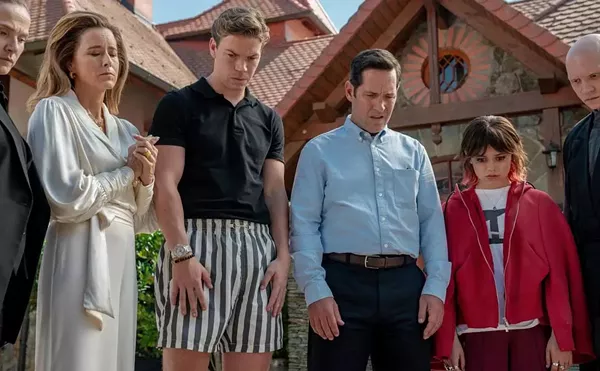The setting is present-day Japan. A man has been receiving anonymous letters informing him that his wife is being unfaithful. He decides to test the letters' veracity by returning home earlier than usual from a customary fishing trip, only to find her and her lover in flagrante delicto. Enraged, he stabs the lover and then brutally slaughters his wife, improbable geysers of blood splattering the camera lens.
Flash forward eight years and the man is being released from prison -- apparently adultery is a very mitigating circumstance in Japan. During his incarceration he has mastered the mysterious craft of cutting hair and so plans to settle down in a small coastal village and open a barber shop, under the watchful eye of his parole officer -- who is also a Buddhist priest -- and with the consoling companionship of his pet eel. Why an eel? the priest not unreasonably asks. Because, the man explains, it listens to me when I talk and it doesn't tell me the wrong things in return.
All this barely takes us past the opening credit sequence of writer-director Shohei Imamura's new film, and anyone familiar with some of his earlier, somber and often edgy efforts -- e.g. Vengeance is Mine, Black Rain -- may think they have a sense of where this is all going. But while the graphic murder of the film's opening minutes lingers over the proceedings like the promise of possible chaos, the mood soon turns lightly comic then almost sweetly romantic.
The barber -- played by Koji Yakusho, star of the recent Shall We Dance -- is a tight-lipped, rather withdrawn type -- except when he's alone with his eel. Yet he soon accrues a collection of local eccentrics who like to hang out at his shop, as well as, through circumstances best left for the viewer to discover, a female assistant who reminds him of his late wife and who is determined to break through the seemingly impenetrable wall he has put between himself and the rest of humanity.
As the poetic awfulness of the tale's initial bloodletting suggests, Imamura is not telling a "realistic" story here. Surrealism, slapstick and far-fetched plot turns move the story away from case history toward fable. The movie's attitude toward the barber is both audacious and ambiguous -- it's suggested at one point that the accusing letters he received about his wife might have been hallucinations. It's a daring film which manipulates us with great skill, one that asks us, as it winds its way toward an ostensibly feel-good ending, to wish for a better life for its psychopathic, homicidal hero.
Richard C. Walls writes about the arts for the Metro Times. E-mail him at [email protected].





